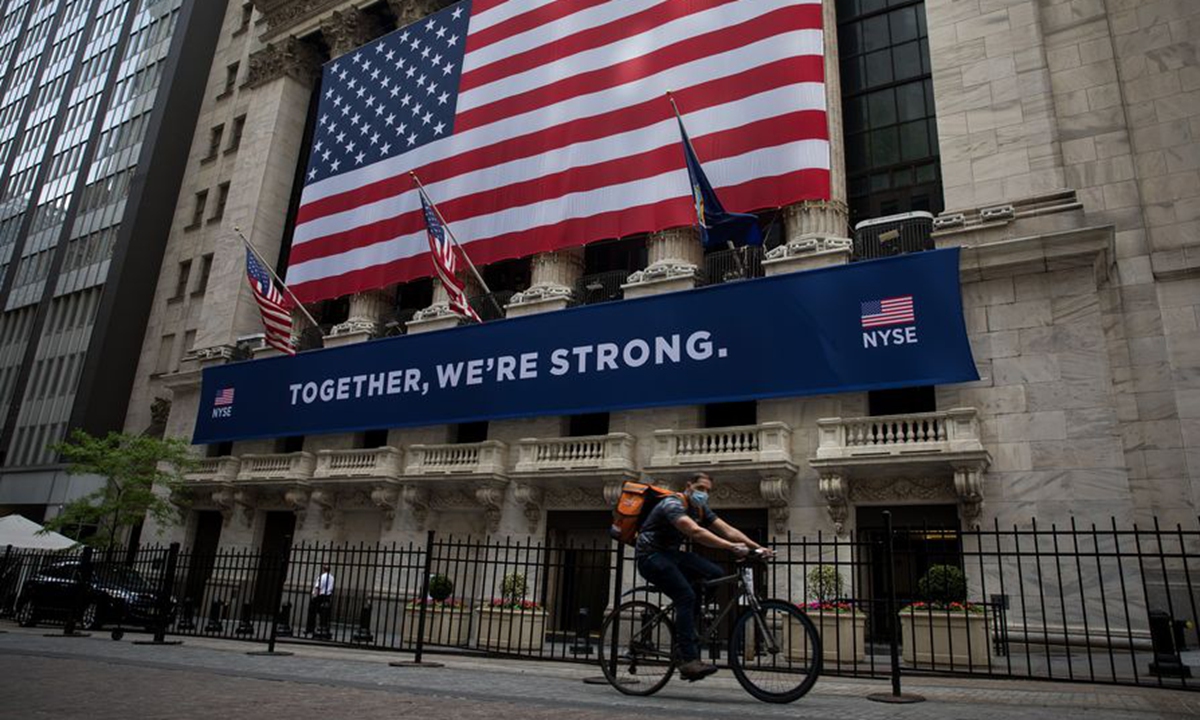Chinese companies might delist as US tightens securities market regulations
By Xie Jun Source: Global Times Published: 2020/8/11 22:39:34

A delivery man wearing a face mask rides past the New York Stock Exchange (NYSE) in New York, the United States, May 27, 2020. (Photo by Michael Nagle/Xinhua)
Many of the small-sized Chinese companies that are currently listed on US stock markets might delist amid efforts by US regulators to crack down on Chinese firms in the US, experts said.The US has given a deadline by which Chinese companies listed there must comply with US accounting standards. According to US Treasury Secretary Steven Mnuchin, companies from China and other countries that do not comply with the accounting standards will be delisted from US stock exchanges as of the end of 2021, Reuters reported on Tuesday.
This means that companies listed in the US, including industry mammoths like Alibaba, are left with about 16 months to deal with the thorny situation. They must find ways to prove that they comply with US audit requirements or potentially delist.
The former method, however, isn't that easy to achieve as the US government might find fault with Chinese companies in the process of checking their accounting standards, Chinese experts said.
"Resorting to the services of an influential US auditing company might help to a certain extent, but Chinese companies might be required to submit files or information they are not allowed to provide according to Chinese law because they involve state secrets," Thomas Yeung, vice dean of the Futian School of Finance and an expert based in Hong Kong, told the Global Times on Tuesday.
Ouyang Rihui, a professor at the Central University of Finance and Economics, said that based on the current situation, China-US relations are unlikely to improve in the short term, and the US might "nitpick" when investigating the accounting situation of US-listed Chinese firms.
"Chinese companies listed in the US might be forced to delist. That would mean the model of Chinese Internet companies getting funding through the US stock markets would have to change, and those companies would need to search for a new development model," Ouyang told the Global Times on Tuesday.
The Global Times asked several US-listed Chinese companies to comment on the issue, but they all declined to speak about it.
On Monday, shares in most US-listed Chinese firms edged down. Alibaba's share price fell 1.57 percent, while the share price of pinduoduo.com fell by 0.76 percent.
But experts predicted that companies of different sizes might be influenced by the US crackdown in different ways.
Small US-listed Chinese companies, such as those valued at less than $100 million, will be more likely to delist, said Dong Dengxin, director of the Finance and Securities Institute at the Wuhan University of Science and Technology.
"Small companies might not want to tolerate the high auditing costs. Also, their cost of going private will be much lower compared with industry giants," Dong told the Global Times, adding that large companies should still try to adapt to the rules of the US stock markets before resorting to more drastic means.
Yang predicted that large Chinese companies listed in the US might choose to cooperate with each other, whether in delisting or fighting the US crackdown together. "Also, if they are united, they have bargaining power instead of being attacked one by one," Yang said.
The US announcement is expected to prompt six to nine Chinese companies currently listed in the US to undertake secondary listings in Hong Kong in the second half of this year, according to a report by Deloitte on Tuesday.
Posted in: MARKETS